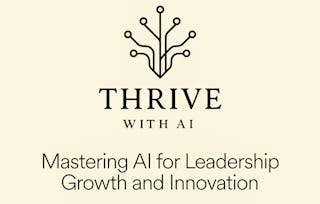Finding meaningful work and happiness in the AI age depends on you - your ability to learn, unlearn, and re-learn at the pace of technological change. Follow Edward D. Hess, Professor Emeritus of Business Administration at the Darden School of Business, as he lays the groundwork for personal development and exceptional leadership in an era of exponential technological growth.

Human Excellence in the AI Age, Part 2: A Soft Skills Course

Human Excellence in the AI Age, Part 2: A Soft Skills Course

Instructor: Edward D. Hess
Included with
Recommended experience
What you'll learn
Tools to help you be more resilient and make better life choices and decisions.
Strategies to work towards becoming your Best Self.
Skills you'll gain
- Empathy & Emotional Intelligence
- Self-Awareness
- Cognitive flexibility
- Active Listening
- Quick Learning
- Team Building
- Adaptability
- Leadership Development
- Relationship Building
- Emotional Intelligence
- Resilience
- Critical Thinking
- Collaboration
- Willingness To Learn
- Personal Development
- Professional Development
- Skills section collapsed. Showing 9 of 16 skills.
Details to know

Add to your LinkedIn profile
7 assignments
See how employees at top companies are mastering in-demand skills

There are 4 modules in this course
Welcome to Human Excellence in the AI Age Part 2, an exploration into the intersection of human potential and artificial intelligence (AI). In this module, we will lay the foundation for understanding the evolving relationship between humans and AI and how individuals and organizations can strive for excellence in this rapidly changing landscape. In this module, you'll meet your faculty, Edward D. Hess, author of 14 books and Professor Emeritus of Business Administration at the University of Virginia's Darden School of Business. Finally, you'll familiarize yourself with the course structure - video lessons combined with reflection questions and checks for understanding that is designed to help you familiarize yourself with the course so you can make the most of your course experience.
What's included
8 readings
Welcome to the Managing Your Emotions, Owning Your Words and Behaviors module. In the first part of this module, we address the importance of emotions as one of the most misunderstood and mismanaged parts of our existence. Next, we explore the tendency to deny, defend, or deflect (our initial emotional responses) when faced with challenges and conflict. Then, we will reflect on the ways emotional intelligence is particularly critical as we move into the AI Age while learning some practical tools for handling negative emotions. In the second part of this module, we focus on taking ownership over our words and behaviors. We challenge you to avoid the tendency to operate on "autopilot" and instead become fully engaged in each task you undertake throughout the day. Finally, we will review the five gateways to speech articulated by Roshi Joan Halifax and ways that you can take greater control over your mind and body to achieve better quality relationships.
What's included
5 videos2 readings3 assignments1 discussion prompt
Welcome to the How to Out-Think the Technology module. More than ever before, the AI Age will require us to think critically in order to remain relevant in our jobs. In this module, we explore how scientific thinking is essential to question our beliefs, determine what facts and data support our opinions, and seek out disconfirming information to stress test our beliefs. Finally, we'll share tools to support scientific thinking such as critical questions, the "5 Whys" strategy to conduct root cause analysis, and Gary Klein's Premortem Tool to help visualize and prevent failure and evaluate a course of action.
What's included
3 videos1 reading1 assignment1 discussion prompt
Welcome to the You Can't Achieve Excellence By Yourself module. In the last module of the course, we discuss the need to move away from a "survival of the fittest" approach to a more collaborative approach, one in which we achieve our full potential by supporting and building relationships with others. Competition leads to divisiveness, preventing each of us from building the caring, trusting relationships that are going to propel us forward. We need others to help us stress-test our beliefs, demonstrate new ways of thinking, critique, learn, and problem-solve. We also need to become reflective listeners in order to have high quality, meaningful conversations with others. Reflective listening involves being open minded, listening to understand and to learn, being fully present, etc. In this final module, we focus on the types of behaviors that will help us build strong relationships and teams in the AI Age.
What's included
5 videos2 readings3 assignments
Instructor

Explore more from Leadership and Management
 Status: Preview
Status: PreviewUniversity of Virginia Darden School Foundation
 Status: Free Trial
Status: Free Trial Status: Preview
Status: PreviewHult International Business School
 Status: Free Trial
Status: Free Trial
Why people choose Coursera for their career

Felipe M.

Jennifer J.

Larry W.

Chaitanya A.

Open new doors with Coursera Plus
Unlimited access to 10,000+ world-class courses, hands-on projects, and job-ready certificate programs - all included in your subscription
Advance your career with an online degree
Earn a degree from world-class universities - 100% online
Join over 3,400 global companies that choose Coursera for Business
Upskill your employees to excel in the digital economy
Frequently asked questions
To access the course materials, assignments and to earn a Certificate, you will need to purchase the Certificate experience when you enroll in a course. You can try a Free Trial instead, or apply for Financial Aid. The course may offer 'Full Course, No Certificate' instead. This option lets you see all course materials, submit required assessments, and get a final grade. This also means that you will not be able to purchase a Certificate experience.
When you purchase a Certificate you get access to all course materials, including graded assignments. Upon completing the course, your electronic Certificate will be added to your Accomplishments page - from there, you can print your Certificate or add it to your LinkedIn profile.
Yes. In select learning programs, you can apply for financial aid or a scholarship if you can’t afford the enrollment fee. If fin aid or scholarship is available for your learning program selection, you’ll find a link to apply on the description page.
More questions
Financial aid available,

